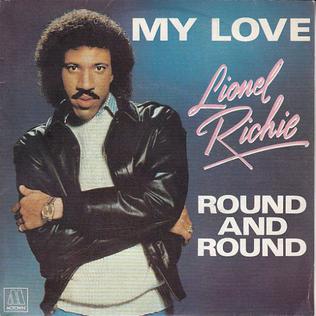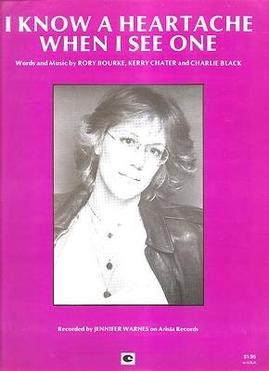
"Me and Bobby McGee" is a song written by American singer-songwriter Kris Kristofferson and originally performed by Roger Miller. Fred Foster shares the writing credit, as Kristofferson wrote the song based on a suggestion from Foster. A posthumously released version by Janis Joplin topped the Billboard Hot 100 in 1971, making the song the second posthumously released No. 1 single in U.S. chart history after "(Sittin' On) The Dock of the Bay" by Otis Redding. Gordon Lightfoot released a version that reached number 1 on the Canadian country charts in 1970. Jerry Lee Lewis released a version that was number 1 on the country charts in December 1971/January 1972 as the "B" side of "Would You Take Another Chance on Me". Billboard ranked Joplin's version as the No. 11 song for 1971.

"Tell Me a Lie" is a song composed by Mickey Buckins and Barbara Wyrick. Originally recorded by Lynn Anderson for her 1974 What a Man My Man Is album, it was released later that same year as a single by Sami Jo Cole, who took it to number 21 on both of the major U.S. pop charts. It also charted in Canada (#17). Cole's version was also an Adult Contemporary hit, reaching number 14 in the U.S. and number 27 in Canada.

"Goodbye Girl" is a song by David Gates, lead singer of Bread, which was released as a single in December 1977 following the premiere of the hit film of the same name. As the theme song to the film, the song reached number 15 on the Billboard Hot 100, becoming the biggest hit of Gates' solo career. It also reached number three on the Adult Contemporary chart. The song is from Gates' third solo album of the same name, released the following year.

"Love Ballad" is a song by R&B/Funk band L.T.D. Jeffrey Osborne is the lead singer.

"Never Be the Same" is the title of the third single by singer-songwriter Christopher Cross, released from his debut Grammy Award-winning album Christopher Cross. It was the singer's third consecutive single to reach the Top 40 on the Billboard Hot 100 chart, where it peaked at No. 15 in 1980. The song was a No. 1 hit on the adult contemporary chart, remaining there for two weeks.

"Crying Time" is a song from 1964 written and originally recorded by the American country music artist Buck Owens. It gained greater success in the version recorded by Ray Charles, which won two Grammy Awards in 1967. Numerous other cover versions have been performed and recorded over the intervening years.

"My Melody of Love" is the title of a popular song from 1974 by the American singer Bobby Vinton. Vinton adapted his song from a German schlager song composed by Henry Mayer, and it appears on Vinton's album Melodies of Love. The song was also recorded by Spanish pop singer Karina as "Palabras de Cristal".

"Love or Let Me Be Lonely" is a pop song recorded by the soul group The Friends of Distinction and released as a single in early 1970. The song was a multi-format success, peaking at #6 on the Billboard Hot 100 on May 1, 1970. It also reached #13 on the R&B chart, and #9 on the Adult Contemporary singles chart. The song is ranked as No. 63 on the Hot 100 singles of 1970.

"My Love" is a song by American singer-songwriter Lionel Richie. It was released in 1983 as the third and final single from his self-titled debut solo album. The song features harmony backing vocals by country music singer Kenny Rogers. It reached the top 10 on three notable Billboard magazine charts in the spring of 1983: on the Billboard Hot 100 the song peaked at No. 5; on the Adult Contemporary chart, the song spent four weeks at No. 1; and on the R&B chart, the song topped out at No. 6. "My Love" was not among Richie's more successful singles in the United Kingdom, where it only managed to reach No. 70 on the UK Singles Chart. In Canada, it peaked at No. 28 on the RPM Top 100 Singles chart.

"Where Were You When I Was Falling in Love" is a popular song written by Jeff Silbar, Sam Lorber and Steve Jobe. It was a hit for singer Lobo and was released as a single in 1979 from his self-titled album.

"An American Dream" is a song written by Rodney Crowell. He recorded it under the title "Voilá, An American Dream" on his 1978 album Ain't Living Long Like This, and released it as the B-side to that album's single "(Now and Then There's) A Fool Such as I".

"Never Ending Song of Love" is a song written by Delaney Bramlett, and, according to some sources, by his wife Bonnie Bramlett. It was originally recorded with their band, Delaney & Bonnie & Friends, in 1971 on the album Motel Shot. Released as a single by Atco Records the same year, "Never Ending Song of Love" became Delaney & Bonnie's greatest hit on the pop charts, reaching a peak of No. 13 on the Billboard Hot 100 and No. 8 on Easy Listening. It reached No. 16 in Australia.

"Stormy" is a hit song by the Classics IV released on their LP Mamas and Papas/Soul Train in 1968. It entered Billboard Magazine October 26, 1968, peaking at #5 on the Billboard Hot 100 and #26 Easy Listening. The final line of the chorus has the singer pleading to the girl: "Bring back that sunny day." The single, along with the prior release of "Spooky" and, soon after, the release of "Traces", formed a trio of solid hits for the band.

"I've Been in Love Before" is a song by English rock band Cutting Crew. Written by lead singer Nick Van Eede, it was released as the second single from the band's debut album, Broadcast (1986). It reached No. 9 on the US Billboard Hot 100 the following year, making the song their second biggest hit in the United States.

"Beautiful" is a song by Canadian singer-songwriter Gordon Lightfoot. This song, which is in the key of B major, first appeared on Lightfoot's 1972 LP Don Quixote and was the first of two singles released. The album's title track appeared on the B-side.

"I Live for Your Love" is a 1987 song by Natalie Cole. It was the second of four charting singles from her Everlasting LP, and was also the second greatest hit from the album.

"I Know a Heartache When I See One" is a song by Jennifer Warnes from her fifth LP, Shot Through the Heart. It was the first of three charting singles from the album.

"Hooked on You" is a song written and composed by David Gates, and originally recorded by the soft rock group Bread, of which Gates was the leader and primary music producer. It was the second single released from Bread's 1977 album Lost Without Your Love, and became their final charting hit.

"I Got to Know" is a song recorded by the American band Starbuck. It was the second of three singles from their debut LP, Moonlight Feels Right. Written and produced by Bruce Blackman, the song was released in September 1976. Like its predecessor, "Moonlight Feels Right," the song features a prominent marimba solo by co-founding band member Bo Wagner.

"The Drum" is a song recorded by Bobby Sherman from his Portrait Of Bobby LP. It was released as a single in the spring of 1971, the second of two from the album. The song was written by Alan O'Day, his first of five Top 40 chart credits.




















